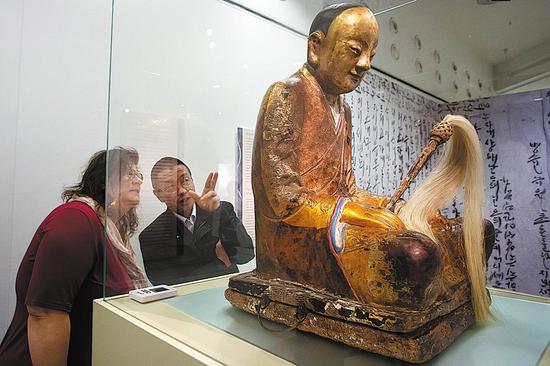Dutch collector ordered to return Buddha statue

The Zhang Gong Patriarch on display at the Hungarian Natural History Museum in Budapest, Hungary, in 2015. (Photo/Xinhua)
A Dutch collector who says he bought the Zhang Gong Patriarch — an ancient Buddha statue containing the mummified remains of a famous monk — has been ordered to return the stolen relic to its original owners, two villages in Fujian province.
The Fujian Provincial High People's Court announced the order on Tuesday, upholding the original ruling made by a lower court about two years ago.
In a verdict in late 2020, the Sanming Intermediate People's Court had demanded that Oscar van Overeem, the Dutch architect and collector who bought the statue, return it to Yangchun and Dongpu villages.
For local villagers, the statue is a significant cultural relic that had been at the Puzhao Temple in Sanming, Fujian province, where they could honor and worship it before it was stolen in December 1995, according to the high court. The lawyer for Van Overeem did not comment or give a statement over the ruling.
After further investigation and trial, the high court said on Tuesday that although Van Overeem has said he bought the statue in Amsterdam in 1996, he could not provide a receipt.
In March 2015, he allowed the statue to be exhibited at the Hungarian Natural History Museum in Budapest, the high court said.
The high court upheld the lower court's ruling that the statue was stolen and is an illegally exported cultural relic. The high court added the statue reflects the traditional customs of southern Fujian and has a special meaning for the villagers, and, therefore, should be returned.
Lawyers from both sides were present when the ruling was announced on Tuesday. A number of legislators, political advisers and journalists were also on hand for the ruling.
Lin Kaian, a villager from Yangchun who was present at the court when the ruling was announced on Tuesday, said: "I'm glad to hear the high court ruled in favor of us demanding the return of the statue. We respect the verdict, and we hope the statue will be back with us as soon as possible."
"If the statue returns, we'll still enshrine it in the temple and welcome others, including foreigners like Oscar van Overeem, to visit it," Lin added.
Xu Huajie, a lawyer of the village committee, told ThePaper, a Shanghai-based news outlet, that mediation will be the next step after the civil litigation ends, so they will also consider negotiating further with the Dutch collector about returning the statue.
Under China's Civil Procedure Law, the litigants can directly apply for a ruling of enforcement to a foreign court if the person is not within Chinese territory.
The application can also be made by Chinese courts in line with international treaties concluded or participated in by the country, or in accordance with the principle of reciprocity, according to Song Jingyi, a civil lawyer from Beijing's Jingsh Law Firm.
"Implementing the ruling, I think, will take some time and may even be difficult, as China and the Netherlands haven't yet mutually recognized the agreement on judicial adjudication so far," she said. "But the recovery of lost cultural relics from overseas through judicial procedures is significant, because it opens a legal way of recovering such relics and also shows our country's determination to protect the relics."
The villagers had been looking for the statue ever since its disappearance. The mystery of its whereabouts was solved for them when reports came out about the exhibit in Hungary after an X-ray revealed the statue contained the mummified remains of the Buddhist monk.